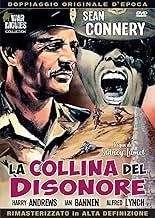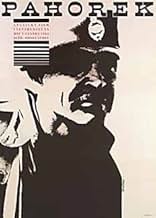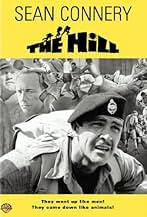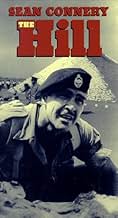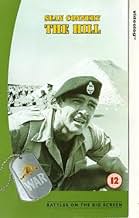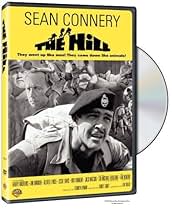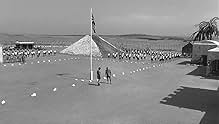AVALIAÇÃO DA IMDb
7,8/10
16 mil
SUA AVALIAÇÃO
Em uma prisão militar do Norte da África durante a Segunda Guerra Mundial, cinco novos prisioneiros lutam para sobreviver às punições brutais e aos guardas sádicos.Em uma prisão militar do Norte da África durante a Segunda Guerra Mundial, cinco novos prisioneiros lutam para sobreviver às punições brutais e aos guardas sádicos.Em uma prisão militar do Norte da África durante a Segunda Guerra Mundial, cinco novos prisioneiros lutam para sobreviver às punições brutais e aos guardas sádicos.
- Ganhou 1 prêmio BAFTA
- 4 vitórias e 6 indicações no total
Michael Redgrave
- The Medical Officer
- (as Sir Michael Redgrave)
Michael Hawkins
- Prisoner
- (não creditado)
James Payne
- Man in Prison
- (não creditado)
Robert Royal
- Prisoner
- (não creditado)
Harold Sanderson
- Officer
- (não creditado)
Avaliações em destaque
The Hill is a brutal film to watch. It stars a (relatively) young Sean Connery as he attempts to avoid being typecast as James Bond and features recognizable British actors in support. It's a psychological thriller set in a prison camp for court-martialed British soldiers, a rugged, terrifying camp run by a ruthless sergeant-major, played by Harry Andrews.
Connery is Joe Roberts, in the klink for slugging a superior officer after refusing to (re)enter the field of battle (his squad was hopelessly outnumbered and outflanked; see also Paths of Glory). Roberts is tossed in a cell with fellow cons George Stevens (Alfred Lynch), Jacko King (Ossie Davis), Monty Bartlett (Roy Kinnear), and Jock McGrath (Jack Watson), who alternately resent and respect Roberts' actions.
The hill of the title is a steep, sandy incline in the middle of the Sahara, where the camp's located. Convicts are tasked with double-timing it up one side and down the other, carrying a loaded backpack and their kit, or duffel bag. And then back again. The hill is used as a way for RSM Wilson (Andrews) to break them, to make them into real soldiers again.
Trouble arises when Wilson's second in command, Staff Sergeant Williams (Ian Hendry) badgers one of the convicts so relentlessly that the man dies, thus kicking the battle of wits between prisoner and gatekeeper to an entirely new level. And this is where we really begin to see the unvarnished war of man versus man, as Wilson and Williams strain to break not only Roberts but also his cellmates.
Connery is really fantastic as the strong-willed Roberts, and Wilson – who played plenty of authoritarian, stiff-backed British characters, is his equal. It's good to see Connery in a movie that transcends his sex appeal and his association with a certain superspy. Filmed in stark black and white (as black and white tends to be), The Hill is near the apex of psychological war films.
Connery is Joe Roberts, in the klink for slugging a superior officer after refusing to (re)enter the field of battle (his squad was hopelessly outnumbered and outflanked; see also Paths of Glory). Roberts is tossed in a cell with fellow cons George Stevens (Alfred Lynch), Jacko King (Ossie Davis), Monty Bartlett (Roy Kinnear), and Jock McGrath (Jack Watson), who alternately resent and respect Roberts' actions.
The hill of the title is a steep, sandy incline in the middle of the Sahara, where the camp's located. Convicts are tasked with double-timing it up one side and down the other, carrying a loaded backpack and their kit, or duffel bag. And then back again. The hill is used as a way for RSM Wilson (Andrews) to break them, to make them into real soldiers again.
Trouble arises when Wilson's second in command, Staff Sergeant Williams (Ian Hendry) badgers one of the convicts so relentlessly that the man dies, thus kicking the battle of wits between prisoner and gatekeeper to an entirely new level. And this is where we really begin to see the unvarnished war of man versus man, as Wilson and Williams strain to break not only Roberts but also his cellmates.
Connery is really fantastic as the strong-willed Roberts, and Wilson – who played plenty of authoritarian, stiff-backed British characters, is his equal. It's good to see Connery in a movie that transcends his sex appeal and his association with a certain superspy. Filmed in stark black and white (as black and white tends to be), The Hill is near the apex of psychological war films.
Stark images, powerful script and performances, and rapid, sharp editing make this film difficult to forget. Director Sidney Lumet stamps his authority on the movie with a style that is gritty, almost documentary -like. The quick cuts are precise, like the snap of the salutes and the bark of the NCO's. Beyond Lumet's towering presence, there is a likeable performance from a young Ossie Davis, an excellent early non-Bond performance from Sean Connery, and Harry Andrews' Sargeant-Major is a remarkable creation - a little man whose job is to destroy these misfits on behalf of a system that will not tolerate individuals.
This remarkable film stays in the mind long after viewing for me, mainly because it announces early on that it is not an easy picture, and like early Frankenheimer, it's aggressive style stands out from the norm. It is a quintessential sixties picture - a time when experiments in style could be taken seriously - not just a smirky in-jokes or cartoonish roller -coaster rides. Exhilarating nonetheless.
This remarkable film stays in the mind long after viewing for me, mainly because it announces early on that it is not an easy picture, and like early Frankenheimer, it's aggressive style stands out from the norm. It is a quintessential sixties picture - a time when experiments in style could be taken seriously - not just a smirky in-jokes or cartoonish roller -coaster rides. Exhilarating nonetheless.
This was one of the most poinant lines of the film, neatly summarising the general mood and feeling of the characters.
A lot of people think that this is an anti-war film, which to some degree it is. More accurately, however, it could be labelled an anti-army film. Interestingly enough both views could be maintained without there being any real warfare displayed on the screen. This is a measure of how powerful the film is.
The fighting which we see is actually between the various prison officers and convicts. The film does not simply divide them into opposing groups, but rather explores the differences and tensions between the people who are in power and those who are subject to it.
Like 'Full Metal Jacket', many years later, this movie is a condemnation of the dehumanising process soldiers are forced to go through in order to survive the army. Military prison, as we learn, is a further step down into the merciless and brutal world of the army.
If 'The Hill' was made today, the violence we see would undoubtedly be more explicit and obvious. However, this does not take away anything from the original , as it is the mental torture more than the physical suffering which is portrayed so well in Lumet's work.
It has aged fairly well, mainly due to the accomplished and original way the film is shot and the script is written. Camera angles to induce feelings of dominance, claustrophobia and pressure are utilised perfectly as are the varying degrees of light and dark contrast which accentuates the blazing sun. Every actor is well cast and gives well judged performances, most career bests. Those that stand out are Bannen, Hendry, Connery and Andrews.
At the core of the film is the struggle between Andrews and Bannen's respective characters for ultimate authority in the prison. The bittersweet ending shows that Andrews' charcter, although shaken, will still reign in the hellhouse of a military prison.
Superb, thought provoking film, that rewards the viewer for staying with it as the powerful ending is reached.
A lot of people think that this is an anti-war film, which to some degree it is. More accurately, however, it could be labelled an anti-army film. Interestingly enough both views could be maintained without there being any real warfare displayed on the screen. This is a measure of how powerful the film is.
The fighting which we see is actually between the various prison officers and convicts. The film does not simply divide them into opposing groups, but rather explores the differences and tensions between the people who are in power and those who are subject to it.
Like 'Full Metal Jacket', many years later, this movie is a condemnation of the dehumanising process soldiers are forced to go through in order to survive the army. Military prison, as we learn, is a further step down into the merciless and brutal world of the army.
If 'The Hill' was made today, the violence we see would undoubtedly be more explicit and obvious. However, this does not take away anything from the original , as it is the mental torture more than the physical suffering which is portrayed so well in Lumet's work.
It has aged fairly well, mainly due to the accomplished and original way the film is shot and the script is written. Camera angles to induce feelings of dominance, claustrophobia and pressure are utilised perfectly as are the varying degrees of light and dark contrast which accentuates the blazing sun. Every actor is well cast and gives well judged performances, most career bests. Those that stand out are Bannen, Hendry, Connery and Andrews.
At the core of the film is the struggle between Andrews and Bannen's respective characters for ultimate authority in the prison. The bittersweet ending shows that Andrews' charcter, although shaken, will still reign in the hellhouse of a military prison.
Superb, thought provoking film, that rewards the viewer for staying with it as the powerful ending is reached.
Sidney Lumet's The Hill is a stark, uncompromising look at the inside of a British military prison in North Africa during WW II. The all-male film, based on Ray Rigby's autobiographical play, is about the brutal mistreatment of prisoners by the screws at a stockade for court-martialed British soldiers.
The titular 'hill' is a monstrous man-made pile of sand seared by the blazing sun, to be used as a means of punishment in the blistering heat. A sadistic martinet Major Bert Wilson (Harry Andrews) runs the show here with an aim to break the soldier-prisoners down and then build them up to return as soldiers. His fascist method of discipline is to have the inmates clambering with full kit in the heat up and down the dreaded hill even if they are exhausted, as part of a punishment designed more to break a man's spirit rather than provide corrective treatment. The screenplay puts the spotlight on a new bunch of five new prisoners, one of whom is the hard-mouthed tank-man Roberts (Sean Connery). Together, they form an eclectic mix but all have one thing in common: they are terrorized by Sergeant Williams (Ian Hendry), a particularly sadistic new guard chosen by Major Wilson, who relishes the task of marching the men up and down the hill and watching them suffer. When Williams goes too far and causes the death of on the five men due to heat stroke, it sparks off a mutiny and Roberts decides to lodge a charge of murder against Williams. The stage is thus set for a dramatic and riveting confrontation, thrusting the drama to its bruising, ironic end.
In this long and unrelenting documentation of life in a military stockade, Sidney Lumet comes up with the sobering revelation that inhumanity is not unique with the enemy, in his own inimitable style. The cinematography is superlative as Oswald Morris shoots the film in monochromatic hues, making you feel parched from minute one. The acting is also top-notch. Harry Andrews is devastating as the sergeant major that runs the camp - a taut, controlled administrator who is a professional military man and Ian Hendry is brilliantly sinister as the evil sergeant who precipitates the crisis. Connery tears up the screen as the rebellious inmate, giving an intelligently restrained performance, carefully avoiding forced histrionics. Ossie Davis gets some of the best scenes and plays them superbly.
'The Hill' is a harsh, sadistic and brutal entertainment, made without any concessions to officialdom - among the best of the sub-genre has to offer.
The titular 'hill' is a monstrous man-made pile of sand seared by the blazing sun, to be used as a means of punishment in the blistering heat. A sadistic martinet Major Bert Wilson (Harry Andrews) runs the show here with an aim to break the soldier-prisoners down and then build them up to return as soldiers. His fascist method of discipline is to have the inmates clambering with full kit in the heat up and down the dreaded hill even if they are exhausted, as part of a punishment designed more to break a man's spirit rather than provide corrective treatment. The screenplay puts the spotlight on a new bunch of five new prisoners, one of whom is the hard-mouthed tank-man Roberts (Sean Connery). Together, they form an eclectic mix but all have one thing in common: they are terrorized by Sergeant Williams (Ian Hendry), a particularly sadistic new guard chosen by Major Wilson, who relishes the task of marching the men up and down the hill and watching them suffer. When Williams goes too far and causes the death of on the five men due to heat stroke, it sparks off a mutiny and Roberts decides to lodge a charge of murder against Williams. The stage is thus set for a dramatic and riveting confrontation, thrusting the drama to its bruising, ironic end.
In this long and unrelenting documentation of life in a military stockade, Sidney Lumet comes up with the sobering revelation that inhumanity is not unique with the enemy, in his own inimitable style. The cinematography is superlative as Oswald Morris shoots the film in monochromatic hues, making you feel parched from minute one. The acting is also top-notch. Harry Andrews is devastating as the sergeant major that runs the camp - a taut, controlled administrator who is a professional military man and Ian Hendry is brilliantly sinister as the evil sergeant who precipitates the crisis. Connery tears up the screen as the rebellious inmate, giving an intelligently restrained performance, carefully avoiding forced histrionics. Ossie Davis gets some of the best scenes and plays them superbly.
'The Hill' is a harsh, sadistic and brutal entertainment, made without any concessions to officialdom - among the best of the sub-genre has to offer.
Hot and sweaty, bold and brutal, Sidney Lumet's The Hill is a tour de force of incarceration based cinema. Story has five new inmates sent to a North African based British Army Prison, the centre piece of which is a manufactured hill that is used as a punishment tool. The new recruits, headed by Joe Roberts (Sean Connery), quickly fall foul of the superiors, especially the venomous Staff Sergeant Williams (Ian Hendry), but these boys wont take it lying down...
With no music and Oswald Morris' monochrome photography ensuring atmosphere is perpetually claustrophobic, the harsh edges of the story strike hard. Be it overt bullying by those in charge - pushing men evidently too far - or racism, Lumet melds everything together superbly for harsh viewing experience, tightening the screws every quarter of film. Come the shattering conclusion it's a merciful release for the viewers, a chance to start breathing properly again, even if your mind is ablaze with a number of thoughts.
This is very much an actors picture, which seems a given since it's adapted by Ray Rigby from his own play, but a mightily strong cast do sterling work with the tinderbox screenplay. Ossie Davis, Harry Andrews, Ian Bannen, Roy Kinnear, Alfred Lynch and Michael Redgrave fill out the other key roles, each giving their characters vivid depth without resorting to histrionics and scenery chewing. Which of course is a testament to Lumet's skills as a director of actors.
Slow burning intensity bristles with the corrosive nature of machismo fuelled authority, an unforgettable film and highly recommended to those who have not sampled it yet. 9/10
With no music and Oswald Morris' monochrome photography ensuring atmosphere is perpetually claustrophobic, the harsh edges of the story strike hard. Be it overt bullying by those in charge - pushing men evidently too far - or racism, Lumet melds everything together superbly for harsh viewing experience, tightening the screws every quarter of film. Come the shattering conclusion it's a merciful release for the viewers, a chance to start breathing properly again, even if your mind is ablaze with a number of thoughts.
This is very much an actors picture, which seems a given since it's adapted by Ray Rigby from his own play, but a mightily strong cast do sterling work with the tinderbox screenplay. Ossie Davis, Harry Andrews, Ian Bannen, Roy Kinnear, Alfred Lynch and Michael Redgrave fill out the other key roles, each giving their characters vivid depth without resorting to histrionics and scenery chewing. Which of course is a testament to Lumet's skills as a director of actors.
Slow burning intensity bristles with the corrosive nature of machismo fuelled authority, an unforgettable film and highly recommended to those who have not sampled it yet. 9/10
Você sabia?
- CuriosidadesFilming took place in Almería, Spain in a sandy wasteland called Cabo de Gata starting in September 1964 for five weeks on location. An old Spanish fort in Málaga was used for the prison.
Many people associated with the production had regarded the filming as pleasant, despite difficult conditions---The temperatures rarely fell below 115 degrees Fahrenheit (46 degrees Celsius), and despite the 2,000 gallons of pure water that were shipped in for the crew, almost everyone succumbed to dysentery during the shoot.
- Erros de gravaçãoThe first time the new arrivals are shown around "the hill" by Staff Williams, the shadow of the rig is clearly visible as the camera performs a 360 degree shot from the top of the hill.
- Citações
Trooper Joe Roberts: We're all doing time. Even the screws.
- Versões alternativasColorized version was broadcast over TNT Network June 7, 1989.
- ConexõesFeatured in The Sun... the Sand... the Hill. (1965)
Principais escolhas
Faça login para avaliar e ver a lista de recomendações personalizadas
- How long is The Hill?Fornecido pela Alexa
Detalhes
Bilheteria
- Orçamento
- US$ 2.500.000 (estimativa)
- Tempo de duração
- 2 h 3 min(123 min)
- Cor
- Proporção
- 1.85 : 1
Contribua para esta página
Sugerir uma alteração ou adicionar conteúdo ausente


